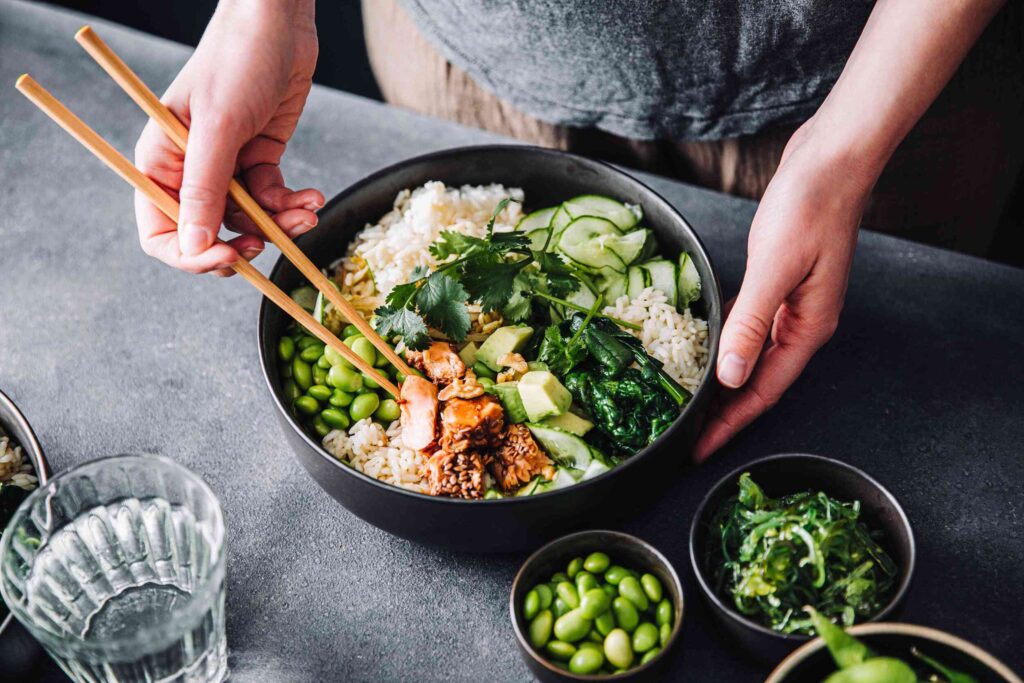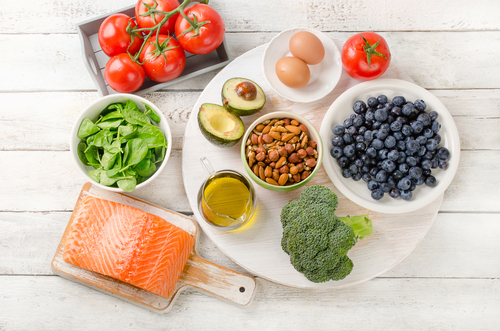Follow the link for a comprehensive anti-inflammatory meal plan aimed at balancing hormones with improved gut health and high energy levels while you enjoy the food served on your plate.
How often do you struggle with continuous bloating, fatigue, or simply feeling unwell? If you think that this is common, then you are right. Increasing numbers of women from different parts of the US are turning to appreciate the role of food – in all its forms – on their wellbeing. The phenomena of having your head in the clouds (brain fog), chronic tiredness, volatile moods, or sluggish and sluggish digestion is often as a result of two powerhouse – hormones and gut health.

And the good news is, you could be looking for the solution right on your plate.
Prepare yourself for this article that will take you on a journey where you will learn to harness the power of food and get that energy and hormones you are struggling with – balancing them with well constructed, mouth watering, and nutritious meals with the help of an anti-inflammatory meal plan tailored specifically to your needs.
What is an anti-inflammatory diet?
Rather consider inflammation as the fire alarm. Is it a good thing to have a fire alarm in case of emergency? Definitely yes! But if the alarm never shuts off, it could start damaging and separating the body from within. Anti-inflammatory foods are known to help those who are in crisis put out the flames of constant inflammation by quelling the internal destruction of the human body.
Crucial foods containing anti inflammatory properties consist of, but are not limited to:
- Greens (Spinach, Kale)
- Berries (Blueberry, Raspberry)
- Fish (Salmon, Sardine)
- Olive Oil
- Turmeric
- Avocados
- Whole Grain (Quinoa, Oats)
- Nuts/Seeds (Chia, Flaxseed)
These nutrient sources promote natural healing processes in the body while also aiding on the important systems such as the digestive system and hormonal system.
Where Hormonal Balance Begins: Your Plate
Estrogen, insulin, and cortisol have a profound impact on day to day living. Imbalance of these hormones can cause acne, period irregularities, emotional instability, increased appetite, fatigue, and chronic problems like PCOS and other thyroid dysfunctions.

Helpful Nutrients for Maintaining Proper Hormonal Functions:
- Minerals and vitamin rich chosen foods, especially those from the deep green vegetables class, support sleep and stress responses
- Cruciferous vegetables such as cauliflower and broccoli assist the liver detoxify estrogen.
- Fats having Omega 3, for example, chia seeds, walnuts, and some species of fish also assist in pro hormone inflammation reduction.
- Whole grain products aid in controlling insulin levels hence stabilizing sugar in blood.
Every hormone can be gently persuaded to its intended rhythm with a few changes in nutrition.
Better Gut Health = Less Inflammation
The gut serves more purposes than just digestion. It’s your body’s second brain. Trillions of bacteria living in it assists with the absorption of nutrients, mood regulation, and inflammation reduction.
Feeding Your Gut:
- Eating fiber-rich foods, especially lentils, oats, and apples.
- Fermented foods such as yogurt, kimchi, and kefir bolster the intestines with living organisms, which enrich gut health.
- Garlic, leeks, asparagus also works as good prebiotics.
- Cut down on added sugar while drinking lots of water.

Having well-nourished intestines enhances digestion, clears up the skin, elevates mood, and assists with hormone regulation.
Weekly Sample of 5-Day Anti-Inflammatory Meal Plan
The daily meal plan provided is easy to prepare using commonly available foods.
Day 1
- Breakfast: Overnight oats with chia seeds, almond milk, and a side of blueberries
- Lunch: Kale and Chickpeas Quinoa Salad with Olive Oil & Lemon Dressing
- Dinner: Baked Salmon with Roasted Sweet Potatoes and Broccoli
- Snack: A handful of walnuts and green tea
Day 2
- Breakfast: Spinach, Banana, Flaxseed & Protein Powder Smoothie
- Lunch: A side of avocado toast with freshly made lentil soup
- Dinner: Grilled Chicken with sautéed Veggies and Brown Rice
- Snack: Carrot sticks dipped in hummus

Day 3
- Breakfast: Scrambled eggs served with avocado, tomatoes, and kale
- Lunch: Turkey wrapped in lettuce with cucumber served with tahini for dipping
- Dinner: Stir fried vegetables with dicded tofu and quinoa with sesame oil
- Snack: Greek yogurt mixed with Apple, cinnamon, and nutmeg
Day 4
- Breakfast: Chia pudding topped with almond butter and rapsberries
- Lunch: Mashed sweet potato along with black beans, garnished with guacamole
- Dinner: Elebrating dinner are shrimp with salad of arugula with lemon vinaigrette
- Snack: Handful of almonds + herbal tea
Day 5
- Breakfast: Whole grain toast with smash avoacado on top followed by a poached egg
- Lunch: Brown rice with tempeh and mixed vegetables serveed with ginger dressing
- Dinner: Roasted Chicken ith thighs with brussels sprouts and serving of wild rice.
- Snack: Squared chocolate served darkalongside a handful of berries.
What to add?
To prevent the afternoon silumps and bursts of jenergy ratios sourced include:
- Homplex carbs from oats or sweet potatoes to fuel the body alongside muscle.
- Omega-3’s to ensure consistent support to the brain while simultaneously taking care of the body’s hormones.
- Healthy fatty repairs with food. Go for avocados, nuts, and or olive oil as they maintain a steady energy level
- Greenery offers a dose of iron and magnesium while fruits serve as antioxidants for vibrant color of berries.

Easy list of purchases Amendments suggestions and prep ideas
Groceries basics:
- Quinoa, oats, and brown rice
- Spinach, kale, leafy greens.
- Broccoli, Brussels sprouts, etc. (cruciferacea).Leafy greens (spinach, kale)
- Wild salmon or sardines
- Chickpeas and lentils
- Olive oil, chia seeds, flaxseed
- Avocados, bananas, and berries
- Fermented foods (yogurt, kimchi)
- Eggs, organic chicken or turkey
Preparation Tips:
- Prepare proteins and grains in lots
- Slice the vegetables ahead of hand and rinse them.
- Put jars of overnight breakfasts or smoothies together.
- Use herbs and spices like turmeric, ginger, and cinnamon for anti-inflammatory benefits.
FAQs
- If I am vegan or vegetarian, might I follow anti-inflammatory diet program?
Certainly. Make sure to cover plant-based protein sources such lentils, tofu, and chia seeds. - How fast does one notice changes from this sort of diet?
A few weeks for some, a week or two for others. Crucial is consistency. - Can I still have coffee or tea?
Yes, green tea, matcha, and even black coffee (free of extra sugar) can be included in an anti-inflammatory diet. - Will this diet improve with PCOS or hormonal acne?
Although individual results can vary, many women who lower inflammation via diet say they have fewer breakouts and better symptoms. - Is this appropriate for individuals dealing with diabetes?
Yes. This plan uses whole foods, complex carbs, and healthy fats, which help stabilize blood sugar. Before beginning a fresh eating plan, as always, seek advice from your doctor or nutritionist.

Pingback: From Fatigue to Vitality: 9 Natural Ways to Balance Female Hormones » nutrivetta.com
Pingback: How to Cope with Anxiety When You’re Living with a Chronic Illness »